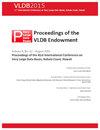b谷歌的Napa并行查询执行的渐进式分区
IF 3.3
3区 计算机科学
Q2 COMPUTER SCIENCE, INFORMATION SYSTEMS
引用次数: 0
摘要
Napa在日志结构的合并树中拥有谷歌的关键数据仓库,用于实时数据摄取和每天数十亿次查询的亚秒级响应。这些查询通常是在高度倾斜的表和索引中进行多键查找。在我们的生产经验中,只有渐进式特定于查询的分区才能实现Napa严格的查询延迟slo。在这里,我们提倡足够好的分区,使每个查询的分区时间保持在较低的水平,而不会冒工作分布不均匀的风险。我们的设计结合了实用的系统选择和算法创新。例如,用键分布的统计信息扩充b树,从而达到辅助查找和分区的双重目的。此外,渐进式分区被设计为“足够好”,从而平衡分区时间和性能。由此产生的系统非常强大,并成功地为每天数十亿的查询提供高质量的服务,形成了谷歌的核心基础设施。本文章由计算机程序翻译,如有差异,请以英文原文为准。
Progressive Partitioning for Parallelized Query Execution in Google's Napa
Napa holds Google's critical data warehouses in log-structured merge trees for real-time data ingestion and sub-second response for billions of queries per day. These queries are often multi-key look-ups in highly skewed tables and indexes. In our production experience, only progressive query-specific partitioning can achieve Napa's strict query latency SLOs. Here we advocate good-enough partitioning that keeps the per-query partitioning time low without risking uneven work distribution. Our design combines pragmatic system choices and algorithmic innovations. For instance, B-trees are augmented with statistics of key distributions, thus serving the dual purpose of aiding lookups and partitioning. Furthermore, progressive partitioning is designed to be "good enough" thereby balancing partitioning time with performance. The resulting system is robust and successfully serves day-in-day-out billions of queries with very high quality of service forming a core infrastructure at Google.
求助全文
通过发布文献求助,成功后即可免费获取论文全文。
去求助
来源期刊

Proceedings of the Vldb Endowment
Computer Science-General Computer Science
CiteScore
7.70
自引率
0.00%
发文量
95
期刊介绍:
The Proceedings of the VLDB (PVLDB) welcomes original research papers on a broad range of research topics related to all aspects of data management, where systems issues play a significant role, such as data management system technology and information management infrastructures, including their very large scale of experimentation, novel architectures, and demanding applications as well as their underpinning theory. The scope of a submission for PVLDB is also described by the subject areas given below. Moreover, the scope of PVLDB is restricted to scientific areas that are covered by the combined expertise on the submission’s topic of the journal’s editorial board. Finally, the submission’s contributions should build on work already published in data management outlets, e.g., PVLDB, VLDBJ, ACM SIGMOD, IEEE ICDE, EDBT, ACM TODS, IEEE TKDE, and go beyond a syntactic citation.
 求助内容:
求助内容: 应助结果提醒方式:
应助结果提醒方式:


